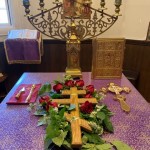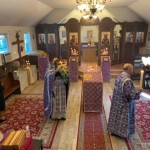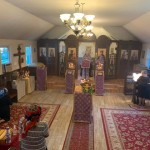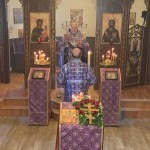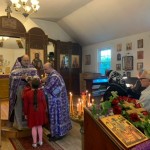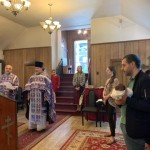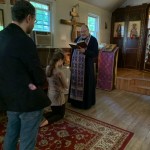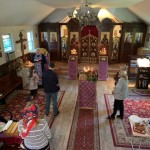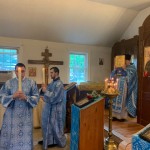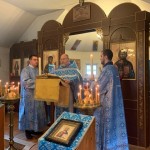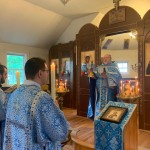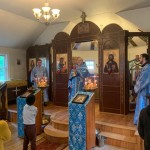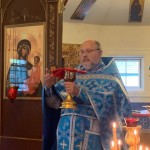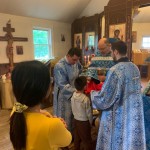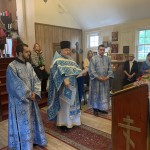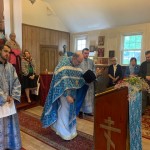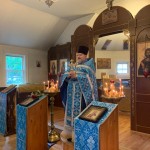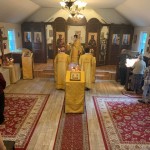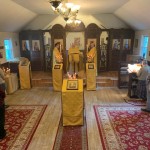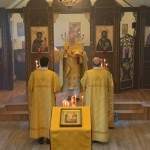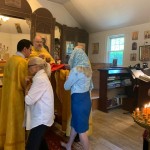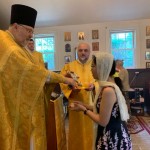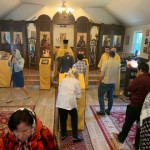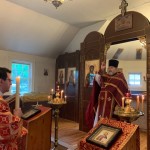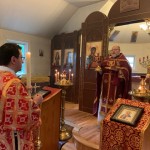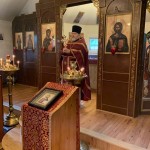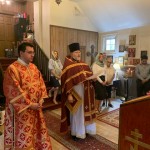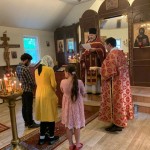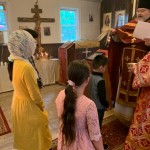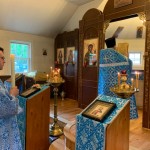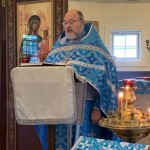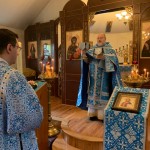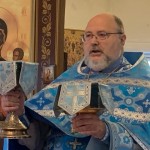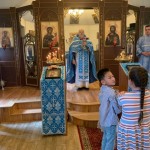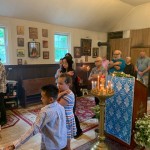On September 27 the Holy Orthodox Church celebrates the great feast of the Universal Exaltation of the Precious and Life-Giving Cross. On that day we had a festal service at St. George Church headed by our Rector, Archpriest Igor Tarasov.
Before the reading of the Hours the Rector and the altar server performed a procession with the Holy Cross. They proceeded from the sanctuary to the middle of the church placing the Cross on the stand and then venerated it.
During the Divine Liturgy, after the Gospel lesson, Fr. Igor preached a homily in Russian. The English version of that homily is as follows:
“Today we celebrate feast of the Exaltation of the Holy Cross. It is a Lord’s holy day but it is not dedicated to some event in the life of Christ, but to the Precious and Life-giving Cross. But the Cross of Christ cannot be separated from the crucifixion. Therefore, in today’s Gospel lesson we hear the sorrowful story of the holy Passions of the Lord, the story of His crucifixion. And today’s Epistle lesson proclaims that “we preach Christ crucified, to the Jews a stumbling block and to the Greeks foolishness” (1 Cor. 1, 23)”.
“To the ancient Greco-Roman world, the Christian claim of the cross was complete foolishness. If you are familiar with Greek mythology, you remember that Greek gods could also take on human appearance. For instance, Zeus did it to chase after women, causing more harm than help. We, Christians, believe that God assumed a human body and soul, not to find pleasure but to enter into our pain. This is the mystery and the glory of the Holy Cross”.
“The sign of the cross is often reduced to a good-luck charm. We wear it around our necks or we may make a sign of the cross when we begin something important. But let us remember that the Cross of Jesus Christ does not promise us success, health, or pleasure. The Cross only promises us that Jesus will be with us, no matter how badly we suffer, no matter how badly we fail, and no matter how horribly we feel. Jesus said, “Lo, I am with you always, even to the end of the age.” (Mt. 28, 20). It is through His Cross that Jesus is with us. That is the meaning of the Cross and that is the meaning of our Christian faith”.
“God enters into the depth, the pit of human experience through Jesus’ crucifixion and death. We are not alone. We wish that the Holy Cross meant that we don’t have to suffer, but it means that God chose to suffer with us. God’s ways are not our ways. The lesson of the Holy Cross is still very hard for us. That is why the Holy Cross became the sign of the Christian faith. Every Orthodox church is adorned by the cross, and the cross is everywhere among the Christian people. It is an emblem of our faith, the most known symbol of Christianity”.
“The Holy Cross is also a sign of hope. When we look on the Holy Cross, we can believe that there is hope beyond our suffering, our failures, and our loss. We can believe that there is hope for the single pregnant mother, hope for the terminally ill, and hope for the poor. There is hope because God will not abandon us in our sufferings”.
“And finally, the Holy Cross is a sign of love. God sent His Only-begotten Son because He loved the world. Our Lord Jesus Christ suffered and died on the cross because He so loved the world. And the Cross is stretching its sides as the Lord Jesus stretched His arms on the Cross to embrace us in His infinite love”.
“Therefore, dear brothers and sisters, we must always exalt and lift up the Cross of Jesus Christ. We must exalt and honor that sign of our faith, the sign of our hope and the sign of God’s love. If the Greek gods played their games with humans, the God of Jesus Christ suffered with human kind. And He suffers with us. Exalting the Precious and Life-giving Cross we should realize that God is indeed with us”.
The choir prayerfully performed hymns of the Exaltation of the Cross before Holy Communion.
After the dismissal of the Liturgy the clergy and the altar server performed glorification of the feast in the middle of the church and venerated the Holy Cross.
Following the Liturgy the Rector served a memorial Litia requested by Juliana Avraam to commemorate her deceased family members. He also performed a blessing of the mother after 40 days since childbirth over Evangelia (Lilia) Douvris praying for her and her newly-born baby. A memorial meal prepared by Juliana Avraam followed all our services.

